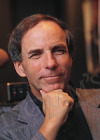HOME | ABOUT US | MEDIA KIT | CONTACT US | INQUIRE
HOME | ABOUT US | MEDIA KIT | CONTACT US | INQUIRE
It’s not whether you win or lose; what really matters is whether you have the inner drive to get into the game.

Not long ago, I had the pleasure of moderating a two-person panel on the subject of entrepreneurship. On the surface, the two panelists had close to nothing in common. One was a 24-year-old New Yorker born into a modest family of Dominican extraction; the other a white, 66-year-old Kansan born into a family of wealth and privilege.
Beyond the superficial, however, they had just about everything in common.
Each was an American. Each sensed the potential of the American Dream. Each had the drive and the wit needed to exploit that potential. And at the Leadership Kansas conference, each explained how he managed to just that.
At 18, John Henry, the New Yorker, worked as a doorman to put himself through college. Congenial by nature, he quickly came to see that the people whose doors he opened and whose cabs he hailed appreciated his good cheer and honest service. They could help him in his career. Some of them did.
One operated a chain of dry cleaners. He offered Henry a wholesale rate on his service if Henry could deliver the clothes of his clientele to his door. The clients would pay the standard retail rate, and Henry would pocket the difference. Henry took him up on it. He then worked out deals with other doormen. For a fee, they sent customers his way. This was honest win-win-win, the essence of the entrepreneurial transaction.
The successful entrepreneur goes places where the complacent don’t bother. For Henry, it was to the New York set of a movie in progress, The Wolf of Wall Street. One of the residents of his building worked on the set and needed costumes picked up at the end of the workday, which might not be until 2 or 3 a.m. That was too late for the ordinary Joe, but just about right for the entrepreneur. Henry took the job and did it well. The word spread in the show biz community.
Now, Henry really had a business. In time, he expanded it to include other personal services—dog walking and housekeeping, for instance—and sold out at age 21 for a cool million. He accomplished all of this without a set-aside for his race or ethnicity. At 3 a.m., no one cares about “metrics.” They care about getting the job done.
More interested in the art of entrepreneurship than in dry cleaning, Henry launched an incubator for business start-ups called “Cofound Harlem” and another line of work podcasting entrepreneurial tips.
As I explained to Henry, I had written my Ph.D. dissertation in 1982 on the subject of the capitalist in the American novel. When I told him that the word “entrepreneur” does not appear in the dissertation for the simple reason it was not then in common parlance, he was shocked. He defined himself first and foremost as an entrepreneur. He could not imagine a time when that means of identification was not available.
Dave Dillon started his career when the only real terms of self-identification were “businessman” or “capitalist.” The former sounded dull and the latter, at least in some circles, demonic. If everyone loves an “entrepreneur,” only Ayn Rand and the capitalist’s heirs loved the “capitalist.”
When Henry launched his career, no one was watching. He made all his mistakes—and all entrepreneurs make them—in something of a vacuum. When Dillon launched his career, everyone was watching or at least they seemed to be. The business was called “Dillon Stores.” His great-grandfather started it. Extraordinarily few businesses make it to the fourth generation. The grocery business was volatile, and the burden on Dave heavy.
In 1983, Dillon Companies and the Kroger Co. merged. Now, Dillon’s name did him little good. If he were to succeed, it would be purely on enterprise. And although Kroger was an established retailer, many major retailers died unexpected deaths in the 30 years of Dillon’s tenure with Kroger.
Kroger was not one of them. Dillon was elected president and chief operating officer of Kroger in 1995. In 1999, under his leadership, Kroger successfully merged with Fred Meyer, Inc., making it the nation’s largest supermarket company. In 2003, Dillon was named CEO of Kroger and in 2004 he was elected chairman of the board. When he retired in 2014, Kroger was America’s largest supermarket chain and the third-largest retailer in the world.
As Dillon explained, he succeeded by imagining Kroger not as a huge business but as a small one, and thinking entrepreneurially when decisions had to be made. I asked Henry whether as a small business, he felt the obligation to act as a large one.
There was, I explained, an interesting local precedent: After serving in the Navy during World War II, Ewing Kauffman returned to Kansas City and started repping for a pharmaceutical company. In 1950, in the entrepreneurial spirit, he started his own company in the basement of his modest home.
Kauffman figured that if he called his business “Kauffman Labs” or “Ewing Labs” potential clients would see it for the one-man shop it was. So he used his middle name instead and called the business “Marion Laboratories Inc.” By the time he sold the business 40 years later, it had nearly $1 billion in annual sales and employed some 3,400 people.
Henry laughed when he heard this story. He told of the extravagant lengths he had gone to create the impression that his was more than a one-man shop as well.
In entrepreneurship as in poker—and Kauffman made his grub stake playing poker in the Navy—there is an element of bluff. No one cares what hand life has dealt you. To win, you just have to have the cards when called.
Leave a Reply